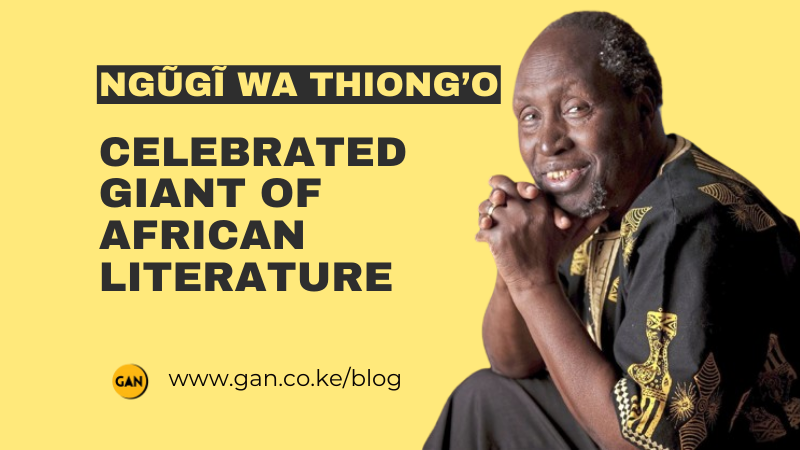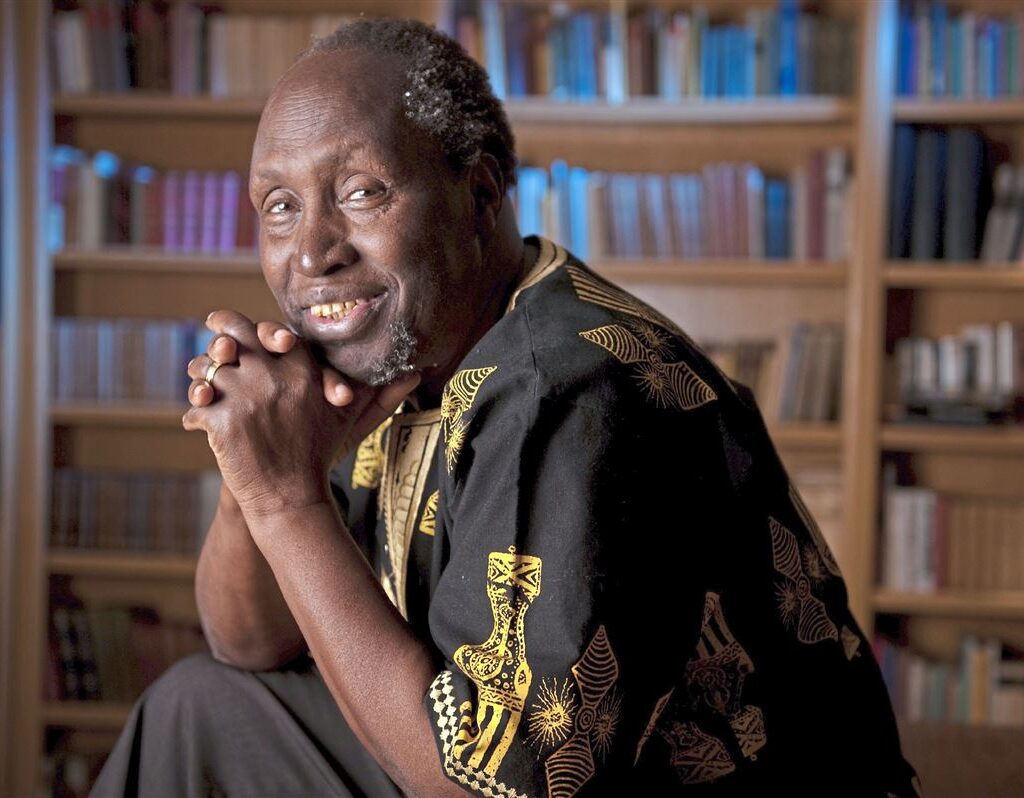
James T. Ngugi alias Ngũgĩ wa Thiong’o was born in 1938 during colonial times into a big peasant family in Kenya. He had his education at the primary schools in Kamandura, Manguu, and Kinyogori; Alliance High School; Makerere University College (formerly a London University branch), Kampala, Uganda; and the University of Leeds, Britain. He is currently a Distinguished Professor of English and Comparative Literature at the University of California, Irvine.
Literary Debut

During his early years, Kenya was a British colony established by settlers (1895-1963).
He experienced the Mau Mau War of Independence (1952–1962) as a teenager, which served as a key motif in his early writings and was the pivotal historical event in the creation of contemporary Kenya. Ngũgĩ made his literary debut in East Africa in 1962 when he staged his first major play, The Black Hermit, at Kampala, Uganda’s National Theatre as a part of the celebration of Uganda’s independence. Professor Trevor Whittock’s criticism of the performance, “Ngũgĩ Speaks for the Continent,” appeared in the student newspaper The Makererian.
Ngũgĩ authored eight more short pieces, two one-act dramas, two novels, and a regular column for the Sunday Nation called As I See It during a prolific writing period. Two novels were released in 1964 and 1965, respectively. The first, Weep Not Child, was well-received by critics. Formally and ideologically, his third piece, A Grain of Wheat (1967), marked a sea change in his output. Instead of the plot developing linearly over time from a single viewpoint, some multiple narrative threads and viewpoints emerge at various times and places. The individual no longer serves as the focal point of history; the group does.
Pan Africanism
Ngũgĩ began his career in 1967 as an English literature lecturer at the University of Nairobi, where he remained until 1977. During this time, he held positions as a Fellow in Creative Writing at Makerere (1969–1970) and as a Visiting Associate Professor of English and African Studies at Northwestern University (1970–1971). Ngũgĩ was central to the politics of English departments in Africa during his time at Nairobi, advocating for the name to be changed from English to simply Literature to reflect world literature with African and third-world literature at its core.
In 1977 James T. Ngugi changed his name to Ngũgĩ wa Thiong’o meaning Ngũgĩ the son of Thiong’o.

He co-wrote the controversial declaration On the Abolition of the English Department with Taban Lo Liyong and Awuor Anyumba, igniting a debate and practices on a continental and global scale that would later form the core of postcolonial theories. Why can’t the “study of the historic continuity of a single culture” be African if one is required? “Why can’t African literature take center stage so that we can see other cultures in light of it?” they questioned. Homecoming, his first book of literary essays, was published in print in 1969 and contains the text. Later on, more books such as Penpoints, Gunpoints and Dreams (1998), Decolonizing the Mind (1986), Moving the Center (1994), and Writers in Politics (1981 and 1997) would follow.
Troubles with the ruling government
Ngũgĩ’s life and profession underwent significant changes in 1977. In July of that year, Petals of Blood, his first book in ten years, was released.
The life of a neo-colonial Kenyan is depicted in the novel as cruel and brutal. It garnered even more resounding praise from critics both domestically and outside. It was called “this bombshell” by the Kenya Weekly Review and “capturing every form and shape that power can take” by the Sunday Times of London. In the same year, Ngũgĩ and Ngũgĩ wa Mirii wrote the contentious play Ngaahika Ndeenda (I Will Marry When I Want), which was presented in an outdoor theater at Limuru’s Kamirithu Educational and Cultural Center. The play featured players who were villagers’ laborers and peasants. Ngũgĩ was a vocal supporter of the ordinary Kenyans and publicly condemned the injustices and inequalities of Kenyan society. He was also adamant about speaking with them in their languages.
Ngugi was Thiong’o in Prison
At the end of 1977, on December 31, he was arrested and imprisoned at Kamiti Maximum Security Prison without being charged. His memoir, Detained: A Writer’s Prison Diary (1982), has an account of those experiences. During his incarceration in Kamiti Maximum Prison, Ngũgĩ decided to give up writing in English and focus only on writing in his tongue, Gikuyu. He authored the novel Caitani Mutharabaini (1981), which is translated as Devil on the Cross (1982), using toilet paper while he was incarcerated after making that decision.
He was freed in December 1978, a year after he was designated as a Prisoner of Conscience by Amnesty International, thanks to a global effort. Nonetheless, he was not allowed to work at any of the nation’s colleges or institutions during the Moi government. Resuming his creative and theatrical endeavors, he remained a discomfiting voice criticizing the Moi dictatorship.
Assassination Attempts and Exile
After his release, Ngũgĩ continued to criticize Moi’s government through controversial books. Not everyone was happy with him including Mzee.

When Ngũgĩ was in Britain for Devil on the Cross’s premiere and promotion, he discovered that the Moi dictatorship was planning to have him killed upon his return, or, in code, to greet him with a red carpet when he arrived at Jomo Kenyatta Airport. This led to his exile, which lasted from 1982 to 1989 in Britain and from 1989 to 2002 in the United States. During this period, he was persecuted by the Moi dictatorship, which made vain attempts to have him removed from London and other places he traveled. An assassination plot outside his hotel in Harare during a seminar in 1986 was foiled by Zimbabwean security.
Matigari, his subsequent Gikuyu book, was released in 1986. Mzee Moi issued an arrest warrant for the main character of the book, believing him to be a real live person. However, after discovering that the character was made up, he had the book “arrested” instead of the real person. The novel was taken away by undercover police who raided every bookstore in the nation as well as the publisher’s warehouse. Thus, Matigari was not allowed to be sold in Kenyan bookshops from 1986 to 1996. Additionally, Ngũgĩ’s books were taken out of all educational institutions by the dictatorship.
ICYM: The 9 Best Luxury Long-Distance Bus Companies in Kenya
Life in London
Ngũgĩ supported democracy and human rights in Kenya while living abroad by working with the London-based Committee for the Release of Political Prisoners in Kenya (1982–1998). Between these positions, he held the positions of Writer in Residence for the Borough of Islington, London (1985), Visiting Professor at Bayreuth University (1984), and Film Scholar at the Dramatiska Institute in Stockholm, Sweden (1986). Following 1988, Ngũgĩ held the position of Visiting Distinguished Professor of English and African Literature at The Five Colleges (Amherst, Mount Holyoke, New Hampshire, Smith, East Massachusetts) until the Fall of 1991.
He became a Visiting Professor of English and Comparative Literature at Yale (1989–1992). After holding the Erich Maria Remarque Professor of Languages at New York University from 1992 to 2002, he went on to become a Professor of Comparative Literature and Performance Studies before relocating to his current role at the University of California, Irvine. He stayed in exile from 1982 till the end of the Moi Dictatorship in 2002. Following twenty-two years in exile, he and his wife, Njeeri, returned to Kenya in 2004. There, they were nearly assassinated by four hired shooters.
Ngũgĩ the Literary Giant in Africa
Ngũgĩ has maintained his prolific writing career, penning Wizard of the Crow in 2006—some have even referred to it as his greatest work—which is an English adaptation of the Gikuyu novel Murogi wa Kagogo. The works of Ngũgĩ have been translated into over thirty languages and are still being discussed in books, critical monographs, and dissertations.
In tandem with his scholarly pursuits, he has been actively involved in the creation of literature, serving as an editor to elevate the voices of others. He has served as an editor for the following literary journals: Mutiiri (1992-), Penpoint (1963-64), Zuka (1965-1970), and Ghala (guest editor for one issue, 1964?).
Honorary Doctorates
Among his many accolades are eleven honorary doctorates and the 2001 Nonino International Prize for Literature.
- Honorary Doctor of Humane Letters, Albright College
- Honorary PhD, Roskilde, Denmark
- Doctor of Letters honoris causa, University of Leeds, 2004
- Honorary Doctor of Literature and Philosophy, Walter Sisulu University, 2004
- Honorary Degree of Doctor of Humane Letters, CSU Dominguez Hills, 2005
- Honorary Doctor of Humane Letters, Dillard University, 2005
- Honorary Doctor of Literature, University of Auckland, 2005
- Honorary Doctor of Letters, New York University, 2008
- Honorary Doctor of Letters, University of Dar es Saalam, 2013
- Honorary Doctor of Letters, University of Bayreuth, 2014
- Honorary Doctor of Letters, Yale University, 2017
- Ngũgĩ wa Thiong’o is also an Honorary Foreign Member of the American Academy of Arts and Letters, 2003, and a member of the American Academy of Arts and Sciences, 2014.
Current Life
As a prominent speaker, he has also persisted in giving speeches at many universities across the globe. Among these are the Robb Lectures held in 1984 at Auckland University in New Zealand; the Clarendon Lectures in English given at Oxford University in 1996; the Ashby Lectures at Cambridge in 1999; and the MacMillan Stewart Lectures at Harvard in 2006.


